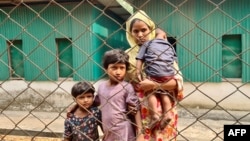ອົບພະຍົບໂຣຮິງຢາ ກ່າວໃນວັນພຸດວານນີ້ວ່າ ເຂົາເຈົ້າຍັງມີຄວາມສົງໄສກ່ຽວກັບການທີ່ມຽນມາໄດ້ສະເໜີດ້ວຍຄວາມຈິງໃຈເພື່ອໃຫ້ກັບຄືນໄປບ້ານເກີດເມືອງນອນຂອງເຂົາເຈົ້າ ໃນຂະນະທີ່ໂຄສົກຂອງພວກທະຫານຂອງປະເທດໄດ້ກ່າວວ່າ ຈະເລີ້ມຕ້ອນຮັບການກັບຄືນມາບັນດາສະມາຊິກຊົນກຸ່ມນ້ອຍທີ່ຖືກປະຫັດປະຫານນັ້ນ ໃຫ້ກັບຄືນຄືນປະເທດໂດຍໄວໃນເດືອນໜ້ານີ້ ອີງຕາມລາຍງານອົງການຂ່າວຝຣັ່ງ AFP.
ຄະນະຜູ້ແທນຕາງໜ້າໃຫ້ທະຫານມຽນມາ 17 ຄົນ ຢູ່ໃນບັງກລາແດັສອາທິດນີ້ ເພື່ອຈະຖືໂອກາດສຳພາດກັບບັນດາຜູ້ສະໝັກກັບຄືນ ຫ້າປີກວ່າໆຫລັງຈາກໄດ້ມີການປາບປາມຢ່າງໂຫດຮ້າຍຂອງທະຫານ ທີ່ໄດ້ຂັບໄລ່ຊາວໂຣຮິງຢາຈຳນວນຫລວງຫລາຍ ອອກຈາກບ້ານເຮືອນຂອງເຂົາເຈົ້າ.
ການຢ້ຽມຢາມທີ່ໄກ່ເກ່ຍໂດຍຈີນ ແລະສ່ວນນຶ່ງແມ່ນດຳເນີນໂດຍສະຫະປະຊາຊາດ ທີ່ໄດ້ເລີ້ມຕົ້ນ ຂໍ້ຕົກລົງສົ່ງກັບຄືນລະຫວ່າງສອງປະເທດ ທີ່ໄດ້ແກ່ຍາວມາເປັນເວລາຫລາຍປີ ອັນເປັນສ່ວນນຶ່ງໃນຄວາມຢ້ານກົວວ່າ ພວກອົບພະຍົບຈະບໍ່ມີຄວາມປອດໄພສຳລັບເຂົາເຈົ້າໃນການກັບຄືນໄປ.
ແຕ່ຊາວໂຣຮິງຢາຖືກສຳພາດໂດຍຜູ້ຕາງໜ້າທະຫານ ໄດ້ກ່າວຕໍ່ອົງການຂ່າວ AFP ວ່າ ບໍ່ມີຄຳຖາມໃດໆຕໍ່ເຂົາເຈົ້າກ່ຽວກັບຄວາມປອດໄພຫລືຮັບຮູ້ສິດທິຂອງເຂົາເຈົ້າໃນການຖືສັນຊາດຢູ່ໃນມຽນມານັ້ນ ໄດ້ຮັບຄຳຕອບ.
“ເຂົາເຈົ້າໄດ້ລື້ງເຄີຍຕໍ່ການກະທຳແກ່ພວກເຮົາທີ່ບໍ່ດີຢູ່ທີ່ນັ້ນ. ຂ້າພະເຈົ້າໄດ້ຖາມວ່າ ພວກເຮົາຈະສາມາດໃຊ້ຊີວິດແບບທຳມະດາບໍ່ຢູ່ທີ່ນັ້ນ ແຕ່ວ່າເຂົາເຈົ້າໄດ້ຢຸດຂ້າພະເຈົ້າ” ນັ້ນຄືຄຳເວົ້າຂອງນາງຊຳຊັນ ນາຮາ ອາຍຸ 40 ປີ ແມ່ຍິງໂຣຮິງຢາ ໄດ້ກ່າວຕໍ່ອົງການຂ່າວ AFP.
ນາງກ່າວເພີ້ມວ່າ “ເຂົາເຈົ້າບໍ່ຕ້ອງການຄຳຖາມໃດໆອີກ ຂ້າພະເຈົ້າບໍ່ຄິດວ່າ ເຂົາເຈົ້າຈະເອົາພວກເຮົາໄປມຽນມາ. ຖ້າຫາກເຂົາເຈົ້າເຮັດ ເຂົາເຈົ້າຈະບໍ່ໃຫ້ສິດທິໃດໆແກ່ພວກເຮົາ.”
Rohingya refugees said Wednesday they doubted Myanmar was offering a genuine return to their homeland, as a spokesman for the country's military junta said it would begin welcoming back members of the persecuted minority as soon as next month.
A delegation of 17 officials from Myanmar's junta was in Bangladesh this week to interview potential candidates for return, more than five years after a brutal military crackdown drove immense numbers of Rohingya out of their homes.
The visit, brokered by China and partly facilitated by the United Nations, jumpstarted a repatriation agreement between the two countries that has languished for years, partly over fears that the refugees would not be safe on their return.
But Rohingya interviewed by the delegation told AFP that none of their queries about security or recognition of their right to citizenship in Myanmar had been answered.
"They used to treat us badly there. I asked whether we would be able to live a normal life there, but then they stopped me," Shamsun Nahar, a 40-year-old Rohingya woman, told AFP.
"They did not want any more questions," she added. "I don't think they will take us to Myanmar. If they do, they won't give us any rights."




